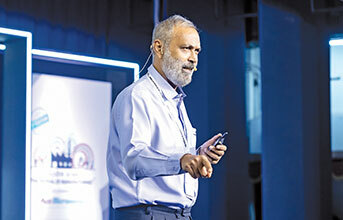
Speaking at the Festival of Manufacturing in Mumbai, Sudhanshu Mani, the visionary behind the Vande Bharat Express, shared his thoughts on dreams, innovation, and the power of ownership in transforming India's manufacturing ecosystem. He set the tone with a quote from Shakespeare: "If to do were as easy as to know what were good to do, chapels had been churches and poor men's cottages, princes' palaces." This, he explained, encapsulates the challenge of turning ambition into reality—a challenge he himself encountered in the journey to create India's first indigenously built semi-highspeed train.
The dream of a train that represents India
Mani spoke about his lifelong dream of seeing India design and manufacture a worldclass train. "Despite having one of the largest railway networks in the world, we never really owned our train technology," he said. For years, India relied on foreign expertise to build locomotives and coaches, never truly creating something entirely its own.
This dream, he admitted, was not one that materialised overnight. "Dreams require patience," he noted. "It took 57 years for my moment to arrive." That moment came when the opportunity arose to lead the design and manufacturing of what would become the Vande Bharat Express—India's answer to high-speed rail, designed and built entirely within the country. "Like fine wine, some dreams need time to mature," Mani reflected.
The importance of ownership in creation
Mani stressed the critical role of ownership in innovation. "We have been manufacturing locomotives for decades, yet the designs were never truly ours," he pointed out. "Technology isn't just about transferring knowledge; it's about making it your own. It's about investing more than just effort—it's about pouring your pride into what you create."
Recalling an experience from 2009, he spoke about a collaboration between Indian engineers and General Motors, the global leader in diesel locomotives. "Back then, locomotives above 5,500 horsepower were being built only in China and the U.S. We had a chance to join that league—but under GM's leadership. We refused to be just followers. We took control and designed a powerful locomotive ourselves, importing only the engine," he shared. "That was a moment of true ownership."
The restlessness that drives progress
"Progress never comes from comfort," Mani remarked. "It requires a certain restlessness—an unwillingness to accept the status quo." He emphasised that great nations are not built by policies alone but by individuals who challenge limitations. "The world does not hand out progress; you have to claim it," he asserted.
Citing Shakespeare again, he added, "Strong reasons make strong actions." He called on India's youth to move beyond dreams and act with conviction. "Dreaming is easy. Execution is where the real challenge lies."
Human resource: The heart of innovation
Despite rapid advancements in artificial intelligence and mechanisation, Mani believes that human resource remains the most valuable asset. "Machines don't innovate—people do," he stated. He shared an anecdote from his time as General Manager at the Integral Coach Factory (ICF) in Chennai. "I would walk the factory floor and simply ask workers, ‘Any problem?' Most often, the answer was, ‘No problem, sir.'"
He stressed that leadership is not about issuing orders from behind a desk but about engaging with people, listening to their concerns, and fostering an environment of motivation. "Real transformation isn't driven by policies alone but by making people feel valued and inspired," he said.
Simple solutions to complex problems
According to Mani, complex challenges often have surprisingly simple solutions. "We tend to overcomplicate things," he said. "But sometimes, small changes in morale, efficiency, and communication can lead to major improvements." The transformation at ICF, he explained, wasn't the result of grand reforms but a series of simple, meaningful interactions that improved worker engagement and productivity.
A vision for India's future
As India marches toward Viksit Bharat 2047 (Developed India 2047), Mani believes the country has the potential to be a global leader in manufacturing and innovation. But for this to happen, India must move beyond borrowed technology and embrace indigenous innovation with pride.
Quoting Sam Altman, he remarked, "Don't try to compete with us; you have no hope. But it is your responsibility to make an attempt."
Mani acknowledged the challenges ahead but remained optimistic. "True progress never comes easy," he said. "But if we're willing to own our creations, challenge our limits, and empower our people, there's nothing India cannot achieve."
The power of dreams
In his closing thoughts, Mani reflected on the nature of dreams. "They are not bound by age or circumstance. Sometimes they lie dormant for years, waiting for the right moment," he said.
He left the audience with a message for India's youth: "Live your dreams, but don't forget what supports you—your family, your health, your friends, and your spirit. And when your moment arrives, seize it with both hands. And above all, when you create, make it truly your own."
With that, he reinforced his belief that Indian Railways, much like India itself, is on a journey—one filled with aspirations, challenges, and the relentless pursuit of excellence. "The tracks are laid, the destination is set," he concluded. "The only question is— who among us will rise to the challenge and drive India forward?"
